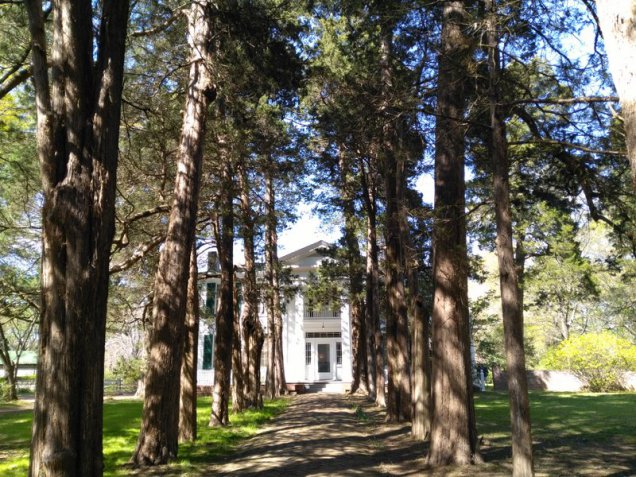From my notebook, 1 April 2017 (Oxford, Mississippi)
 Rowan Oak, Oxford, MS
Rowan Oak, Oxford, MS
Sitting on the Adirondack chair on William Faulkner’s “patio” at Rowan Oak.
I walked from Oxford town square, past the Makers’ Market with people selling crochet butterflies and canvas wall-hangings. Past the white marble pillar (c. 1907) praising Confederate soldiers who died for “a just and holy cause”, past the courthouse flying the Mississippi state flag with its stars and bars — as if miniaturising renders the symbolism inconsequential.
Eleventh Street between the square and Rowan Oak is so pretty my teeth ache. All those shining white houses, flowers, gleaming silvery roofs. The porch swings fat with overstuffed cushions, faux flames dancing in real lanterns, verandas, roof terraces, white curtains, white benches, white lattice work. Lush green and sweet pinks, reds, fuschias. Confection. A sugar glaze.
Rowan Oak is smaller than many of the houses I passed. Its drama is in the long approach through scattered sentinel trees — cypress and others I don’t recognize. They are well-spaced with swathes of shade dappled grass between, begging to be sat upon.
Faulkner’s bedroom with his riding boots
The exterior is brilliantly white, the interior modest. It looks more like a home of the ’30s or ’40s than the ’50s and later. The furniture is dark wood with heavy upholstery. Walking through the library, writing room, kitchen, and bedrooms is pleasant but unrevelatory. There are no ghosts. Nothing to be gained here.
Outside there’s a party of some sort on the grounds — teenage girls in impossible heels and rolls of satin, faces painted stiff. Storm ‘Time to Burn’ is blaring out of badly balanced speakers. Dogwood, my favourite Southern tree, is in staggering bloom.
Walking through a writer’s house used to charge me with envy. Today, no. Admiration, yes. But I’m no longer sure I have the strength or ego or whatever it takes to be so assured. You have to believe hard in something. Fiction writers, more than non-fiction writers, have to believe hard in themselves. It takes a huge amount of energy and attention to write a book (Orwell compared writing a novel to a long bout of a painful illness). It requires time, resources, patience, and a stubborn certainty that the thing is worth doing.
My one novel, thus far, appeared under such circumstances. I was fed and sheltered, had minimal other responsibilities, and the story had been chewing its way through me for two years before I sat down to write.
Rowan Oak gives a silent account of what a writer needs: financial stability, space, light, privacy, routine, comfort, quiet, moral support, aesthetic pleasure, and independence. It is the embodiment of what Virginia Woolf meant by “a room of one’s own”. Art is not ethereal. It has bodily needs.
When met, they give the artist / writer / musician scope to express his or her creativity. Faulkner memorably resigned from his job as University of Mississippi postmaster with the following letter (via Letters of Note):
As long as I live under the capitalistic system, I expect to have my life influenced by the demands of moneyed people. But I will be damned if I propose to be at the beck and call of every itinerant scoundrel who has two cents to invest in a postage stamp.
This, sir, is my resignation.
He understood that being at anyone’s “beck and call” was antithetical to his ambitions as a writer. Free to write, Faulkner’s talent ignited. For sheer breath-taking mastery of the form, few novels compare to As I Lay Dying. The tragicomic story of the Burden family’s journey to bury their mother, it is excruciating, morbid, and funny, with a killer twist.

Faulkner’s pretty white tree-shaded house was more than a home. It was the omphalos of his literary world. Sitting on the patio, or wandering between the trees, he had space to create and imagine. Modest and practical (right down to the tin mint julep cup), Rowan Oak fitted and enabled his creative life.
Writer’s homes come in all shapes, sizes and configurations, but they are essential to the work.
Advertisements Share this:





